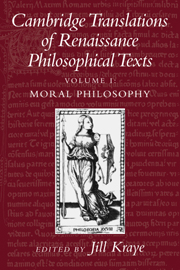Book contents
- Frontmatter
- Contents
- List of Translators
- Preface
- PART I CONCEPTS OF MAN
- PART II ARISTOTELIAN ETHICS AND THE SUPREME GOOD
- PART III ARISTOTELIAN ETHICS AND CHRISTIANITY
- 9 Juan Luis Vives
- 10 Philipp Melanchthon
- 11 Antonius de Waele
- PART IV PLATONIC ETHICS
- PART V STOIC ETHICS
- PART VI EPICUREAN ETHICS
- Bibliography of Renaissance Moral Philosophy Texts Available in English
- Index Nominum
- Index Rerum
9 - Juan Luis Vives
Published online by Cambridge University Press: 05 June 2012
- Frontmatter
- Contents
- List of Translators
- Preface
- PART I CONCEPTS OF MAN
- PART II ARISTOTELIAN ETHICS AND THE SUPREME GOOD
- PART III ARISTOTELIAN ETHICS AND CHRISTIANITY
- 9 Juan Luis Vives
- 10 Philipp Melanchthon
- 11 Antonius de Waele
- PART IV PLATONIC ETHICS
- PART V STOIC ETHICS
- PART VI EPICUREAN ETHICS
- Bibliography of Renaissance Moral Philosophy Texts Available in English
- Index Nominum
- Index Rerum
Summary
Introduction
The Spanish humanist, philosopher and educational theorist Juan Luis Vives (1492–1540) was born in Valencia, the child of converted Jews. After receiving his early humanist training in Spain, he went to Paris in 1509, where he developed a lifelong hatred for the obscurities and complexities of scholastic philosophy. In 1512 he moved to Bruges, where he worked as a private teacher. Transferring to Louvain in 1517, he lectured publicly at the university there for several years. It was in Louvain that he made the acquaintance of Erasmus. The great Dutch humanist commissioned Vives to write a commentary on St Augustine's City of God, which was published in Basel in 1522, with a dedicatory letter to Henry VIII. A year later Vives travelled to England, where he established ties with Erasmus's great friend Thomas More and also with Queen Catherine of Aragon. He was hired by Cardinal Wolsey to teach Greek at Oxford and later became personal tutor to Princess Mary, the daughter of Henry VIII and Catherine. In 1528, a few months before Henry divorced Catherine, Vives returned to Bruges, which remained the centre of his activities until his death.
In 1524 Vives's converso father, a successful merchant, was arrested by the Spanish Inquisition on the charge of resuming Jewish religious practices. After a trial that lasted two years, he was burned at the stake.
- Type
- Chapter
- Information
- Cambridge Translations of Renaissance Philosophical TextsMoral and Political Philosophy, pp. 91 - 107Publisher: Cambridge University PressPrint publication year: 1997



